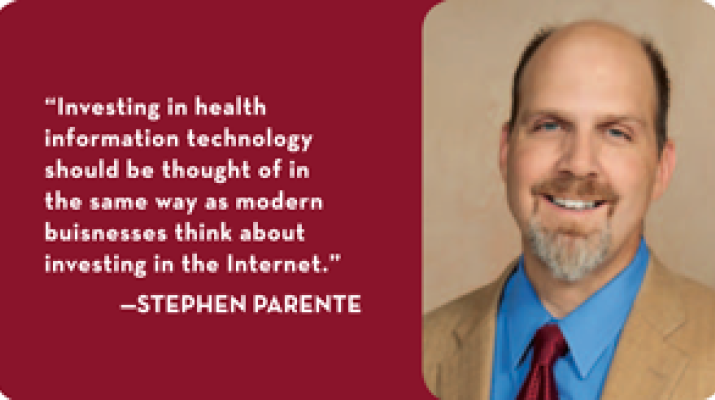
The Effect of Health Information Technology on Patient Outcomes
Thursday, September 1, 2011
Health information technology (IT) has been touted as having the potential to prevent medical mistakes and possibly reduce health care costs by billions of dollars. Professor Stephen Parente thinks it could even transform the entire health care system by enabling us to measure the value of the care patients receive.
But is health IT delivering on its bold promises? And what has been the impact of health IT at the individual level?
Focusing their research on the Medicare population of some 45 million people, Parente and his University colleagues Jeffrey McCullough and Robert Town analyzed every hospital admission over a 10-year period (more than six million observations) to see whether patients became injured or suffered an adverse event while hospitalized.
“The thought is if the hospital has invested in information technology over a period of time the chances of those injuries should be going down, thus creating value for the consumer,” Parente says.
On a global scale, the researchers didn’t find the effect they were looking for. However, when they focused on patients who had numerous specialists involved in their care, the data showed health IT made a discernible difference.

Investing in health information technology should be thought of in the same way as modern businesses think about investing in the Internet.
According to Parente, the data showed that there’s only so much a doctor or nurse can remember and having the system support their efforts resulted in better care. While the study found the patient benefits of health IT currently don’t exceed its costs, Parente still sees it playing a vital role in improving productivity and other quality measures.
“Investing in health information technology should be thought of in the same way as modern businesses think about investing in the Internet,” says Parente. “You need to have this to be in business but the system has to go much more global to reach that tipping point where everyone expects it to do something amazing.”
Recently presented at a National Bureau of Economic Research, Inc. event, “The Effect of Health Information Technology on Patient Outcomes” has generated interest in Washington, D.C. and could guide future research on and implementation of health IT.
“The obvious things we thought we’d find weren’t there,” says Parente. “But now we know where to look to find where this technology can really make a difference and provide the most value.”